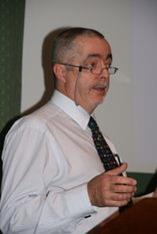
Leading figures in the field of horticultural research urged the industry players to rise above their differences to avoid losing key institutes and to help bring new talent into an ailing sector.
Delegates at the National Horticulture Forum in London heard that a number current research stations are likely to close in the next 10 years at a meeting, which followed the announcement that Warwick HRI’s Wellesbourne site is to close in 2012.
Neil Bragg, chairman of the Horticultural Development Company (HDC), painted a bleak picture. He predicted that the National Institute of Agricultural Botany (NIAB) would be among those to close in the next five years, in forecasting the future of nine stations.
Bragg rated the future of NIAB as "poor" and said that the Stockbridge Technology Centre would cease to exist unless “we get behind it”. He also said the future of the Scottish Agricultural College was "fair".
He was confident, however, that East Malling Research, Greenmount in Northern Ireland and the Scottish Crop Research Institute have solid prospects.
The root of the problem, Bragg claimed, lies as much in the expectations of HDC levy players as the funding itself. He urged levy payers not to expect all of their funding to be ploughed back into their specific crop and appreciate overall strategy had to take up some of the budget.
The HDC receives around £5 million in levy funds each year, of which 90 per cent is put into R&D.
But Bragg expressed concern over the UK's success rate in attaining EU funding and was doubtful as to whether the Technology Strategy Board's "prescriptive" approach would help advance horticultural research.
Several present said that this issue came from a previous attitude, whereby growers were encouraged to look out for their own businesses and collaboration had been driven out of the industry.
Bragg said: “We need to seek to get the remaining expertise in the industry recognised and saved to help mentor the next generation.
“It is extremely difficult to get the next generation in. I would really like young accountancy and marketing students to come into some of the more tired horticultural businesses and rip them apart with new ideas. Growers are growers and they want to, and do do, everything but it’s not sustainable.”
Dr Michael Segal of DEFRA agreed said: “It is important for the Agriculture and Horticulture Development Board to rise above sectional differences. I’m not sure horticulture in the UK is dying but if it is struggling its because of protectionism and when UK consumers have access to fruit and vegetables from around the globe we need to be competing nationally and not with each other.
In a panel debate, Celia Caulcott of the Biotechnology and Biological Sciences Research Council said the challenges were based in working out which resources are short “burying the idea of selfish immediacy” in favour of wider issues.



